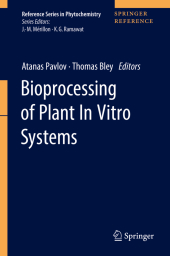 Neuerscheinungen 2018Stand: 2020-02-01 |
Schnellsuche
ISBN/Stichwort/Autor
|
Herderstraße 10
10625 Berlin
Tel.: 030 315 714 16
Fax 030 315 714 14
info@buchspektrum.de |

Thomas Bley, Atanas Pavlov
(Beteiligte)
Bioprocessing of Plant In vitro Systems
Herausgegeben von Pavlov, Atanas; Bley, Thomas
1st ed. 2018. 2018. xvii, 589 S. 45 SW-Abb., 46 Farbabb., 200 Farbtabellen. 235 mm
Verlag/Jahr: SPRINGER, BERLIN 2018
ISBN: 3-319-54599-X (331954599X)
Neue ISBN: 978-3-319-54599-8 (9783319545998)
Preis und Lieferzeit: Bitte klicken
This handbook presents how plant in vitro technologies can overcome current limitations in the production of important plant-derived substances. It explains the advantages of plant in vitro technologies, notably the independence from climatic and soil conditions and the ability to synthesize diverse bioactive substances under controlled conditions. Apart from making diverse metabolites, which can be used e.g. as pharmaceuticals, agrochemicals, flavors, colors, biopesticides or food additives, more easily and more efficiently available, the methods described in this handbook also offer the advantage that rare and threatened plants, which provide access to interesting and desired substances, can be better protected, when the substances are harvested from suitable plant in vitro systems. In times of increasing demand for natural plant-derived products, the described methodologies will be key to ensuring efficient and sustainable access to plant-derived products. They will also help and support in the research and investigation of plant secondary metabolites.
Despite these advantages, still only few substances are being produced at industrial scale by in vitro plant cell cultivation systems to date. This handbook therefore advertises the recent achievements and research in the field, focused on solving limitations in yield and bioprocessing conditions. Leading experts summarize the methodology, which can help overcome drawbacks like low yields of target products or problems associated with the cultivation in bioreactors. Readers will find comprehensive information on fundamentals for using different types of plants in vitro as matrix for sustainable production of valuable secondary metabolites. The handbook summarizes the core information on phytochemistry, bioreactor technology and monitoring of plant cells and tissues in bioprocesses. It also discusses selected applications and safety assessment of food and cosmetic ingredients from plant cell and tissue.
16
Plant cell culture technology: A next generation system for sustainable production of valuable natural products.- Engineering cell and organ cultures from medicinal and aromatic plants toward commercial production of bioactive metabolites. - Plant in vitro systems as sources of food ingredients and additives. - Hairy root in vitro systems for bioactive substances production. - Sustainable production of polyphenols and anti-oxidants by plant in vitro cultures.- Production of iridoids and phenylethanoid glycosides by in vitro systems of plants from Orobanchaceae, Budleyaceae and Scrophulariaceae families.- Amaryllidaceae alkaloid accumulation by plant in vitro systems.- Taxus cell cultures, an effective biotechnological tool to enhance and gain new biosynthetic insights into taxane production.- Bioactive substances from grape cell cultures.- Bioreactor technology for sustainable production of plant cell-derived products.- Large-scale cultivation of plant cell, tissue and organ culture for bioactive substances production.- Monitoring of plant cells and tissues in bioprocesses.- Genetic transformation of hairy roots for improvement of yields of secondary metabolites.- Elicitation of secondary metabolism of plant cells cultivated in vitro.- Permeabilization-mediated recovery of metabolites from plant cultures.- Polyploidy and secondary metabolism of plant cells cultivated in vitro.- Application of GC-MS in in vitro plant metabolite profiling.- Microbial transformations of plant secondary metabolites.- Plant micropropagation.- Safety assessment of food ingredients from plant cell and tissue cultures.


